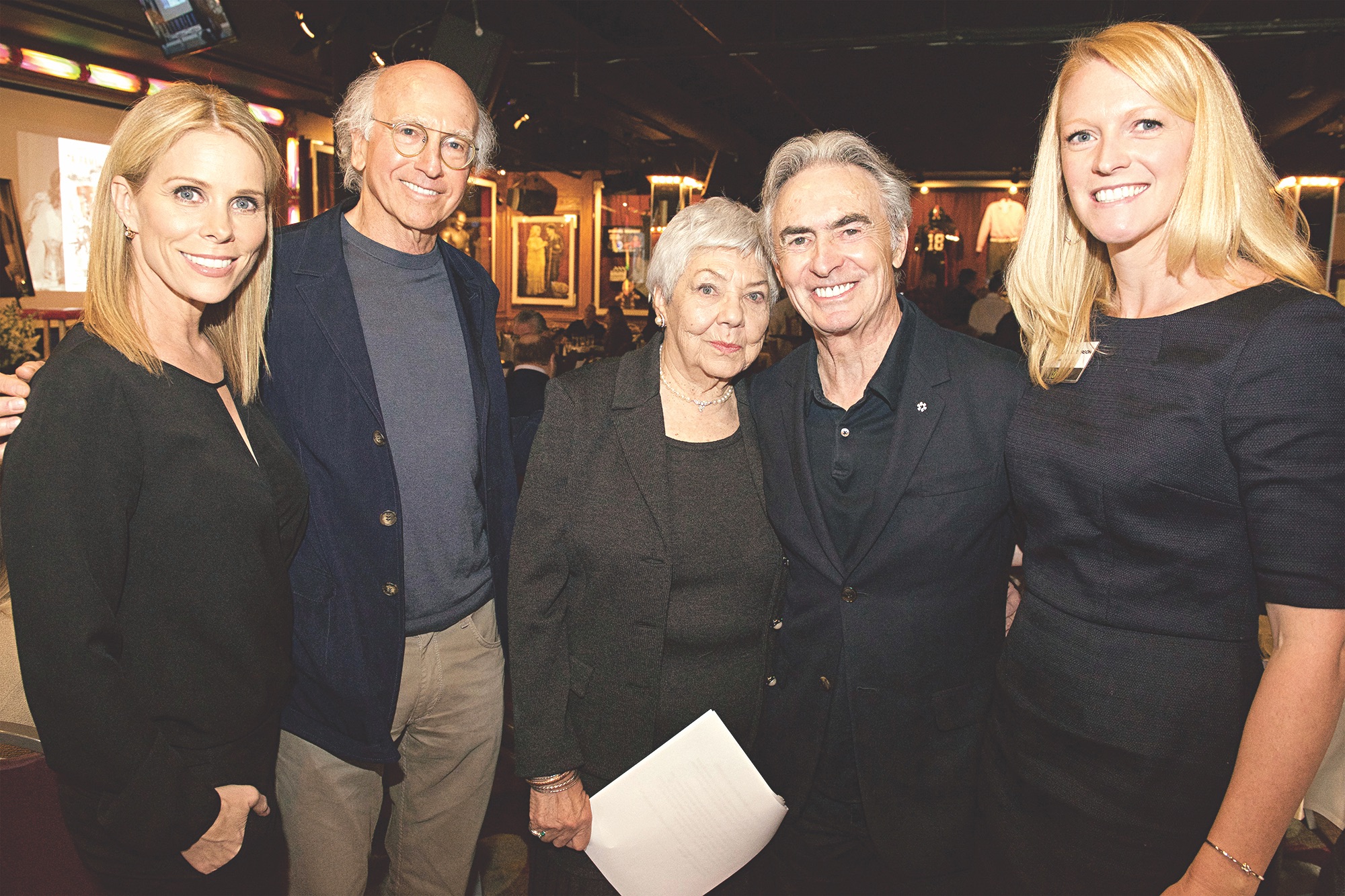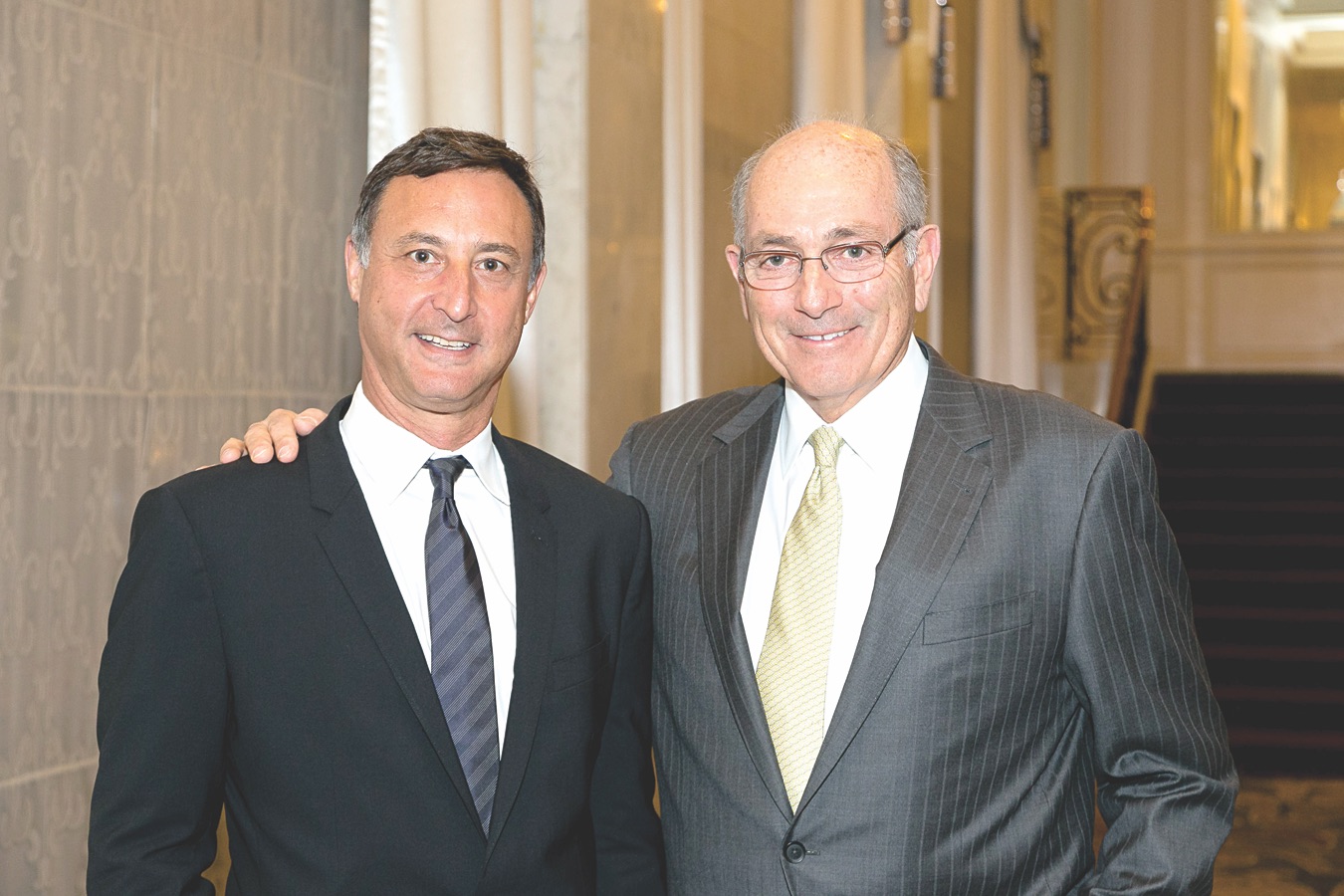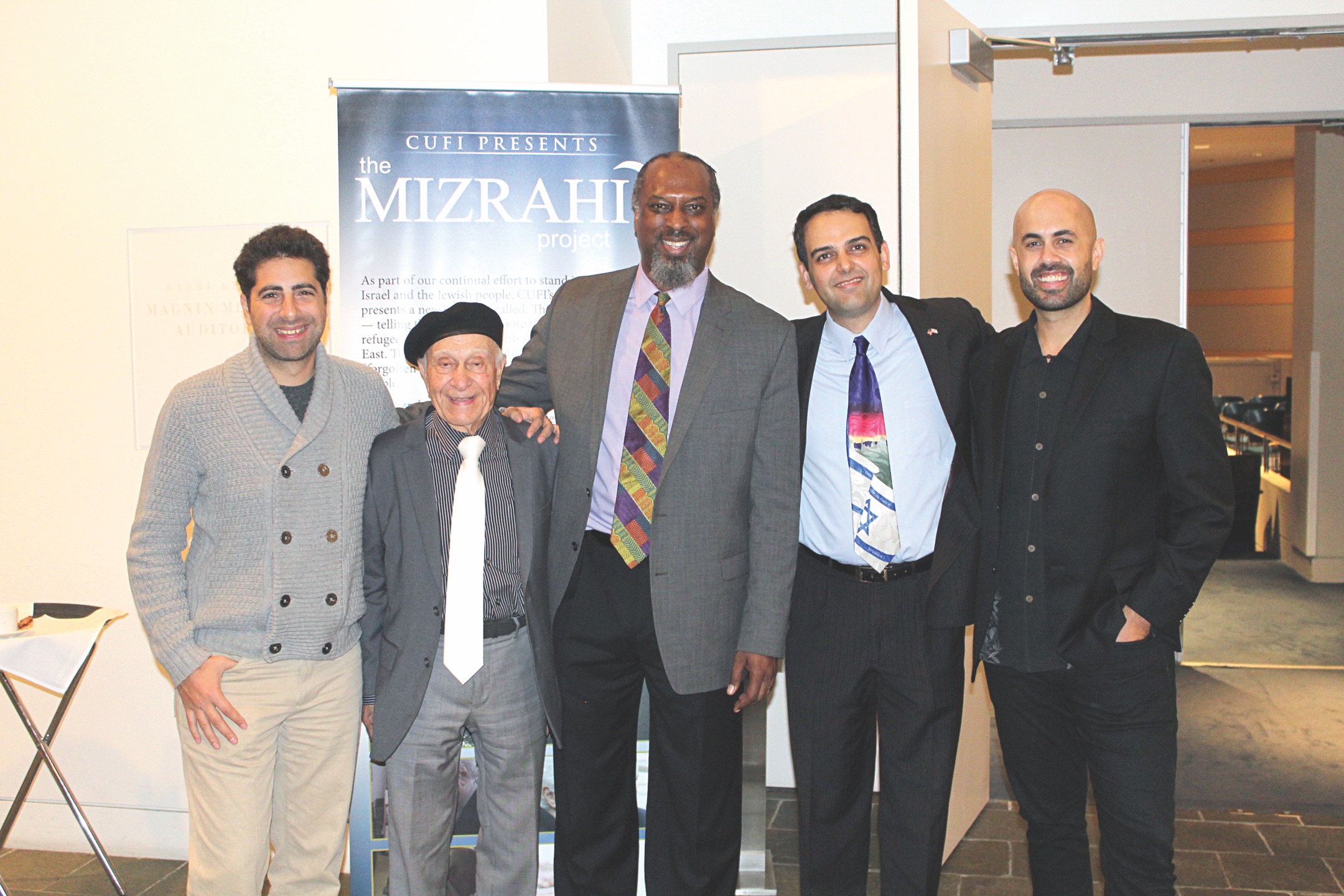 From left: Actor Cheryl Hines; writer and actor Larry David; Shelley Berman’s widow, Sarah; comedian David Steinberg; and Journey Gunderson, executive director of the National Comedy Center, celebrate the National Comedy Center’s acquisition of late comedian Shelley Berman’s archive of material. Photo by Mike Carano
From left: Actor Cheryl Hines; writer and actor Larry David; Shelley Berman’s widow, Sarah; comedian David Steinberg; and Journey Gunderson, executive director of the National Comedy Center, celebrate the National Comedy Center’s acquisition of late comedian Shelley Berman’s archive of material. Photo by Mike Carano Comedy stars Larry David, Cheryl Hines, David Steinberg, Lewis Black and Fred Willard gathered on Jan. 30 at the Comedy & Magic Club in Hermosa Beach to celebrate the National Comedy Center’s acquisition of the archive of late comedian Shelley Berman.
Additional attendees included radio broadcaster Dr. Demento (Barret Eugene “Barry” Hansen), comedian Laraine Newman, producer Alan Zweibel and National Comedy Center Executive Director Journey Gunderson.
Sarah Berman, Shelley’s wife of more than 70 years, also attended. She expressed appreciation to the National Comedy Center for preserving her late husband’s legacy.
“No longer the stepchild to the arts, comedy and those who make us laugh are about to have their own place in the world,” Sarah Berman said. “When I found myself surrounded by all of Shelley’s writings, I wondered what to do with all of it. Do I give it to some museum where they let it gather dust before they throw it away? Along came the National Comedy Center, driven by people who have the vision to know that this material and the material of other comedians has a value.”
Shelley Berman died in 2017 at the age of 92. His archive, which spans from the 1940s to the 2010s, includes photographs, contracts, scripts and rare footage chronicling his career in stand-up comedy, improv, television, comedy writing, film and theater.
The National Comedy Center is a nonprofit cultural institution and visitor experience dedicated to the art of comedy. A ribbon-cutting for the center, which is located in Lucille Ball’s hometown of Jamestown, N.Y., is scheduled for Aug. 1-4.

About 300 people gathered at the Fine Arts Theater in Beverly Hills on Jan. 30 to celebrate the launch of 30 Years After’s new initiative, the Legacy Project, an archive of video testimonies of Persian Jews who fled Iran after the Iranian Revolution.
The Legacy Project aims to professionally record and collect testimonies as a way to link the second, third and future generations of Iranian-American Jews to their history.
During the event, Legacy Project Chair Megan Nemandoust, Iranian American Jewish Federation President Susan Azizzadeh, American Jewish Committee Assistant Director of Interreligious and Intercommunity Affairs Saba Soomekh, 30 Years After President Sam Yebri and 30 Years After community member Liora Simozar shared their reasons for supporting the project.
“With an eye to the future, it is imperative that an easily accessible, professional digital archive exists, capturing the stories and experiences of my family, your family and countless others,” Nemandoust said in her speech at the event. “We are the heirs to Iranian-Jewish history, and through the Legacy Project we’re committed to preserving it for generations to come.”
The Legacy Project is supported by individual donors and families, and 30 Years After is seeking sustained funding from, and partnerships with, institutions and foundations as well as broader community support.
The project also is seeking additional testimonies.
“This project not only preserves these powerful stories and memories for posterity and academia but uses them to connect new generations of Jews of Iranian descent to their rich heritage, traditions and values,” Yebri said. “As we learn from Pirkei Avot (“Ethics of the Fathers”), no hurricane can uproot a tree with more roots than branches. It is imperative that our entire community join us in nurturing our roots in order for our community’s branches to flourish.”
The event began with a reception featuring nontraditional Iranian food, dessert and tea. The screening of the recently recorded interviews followed.
Since 30 Years After was founded in 2007, it has served to promote and engage Iranian-American Jews in American political, civic and Jewish life, as well as connect local community organizations with the large Los Angeles community of Persian Jews.
— Esther D. Kustanowitz, Contributing Writer

Temple Judea in Tarzana held a journey through Cantor Jack Mendelson’s real-life stories based on growing up in 1950s Brooklyn in “The Cantor’s Couch,” which was staged at the synagogue on Jan. 21.
More than 400 people attended to listen to Mendelson paint a picture of a bygone day in Jewish America when Jews would flock to hear cantors at synagogues as if they were performing in a concert hall.
The one-man show wed a relatable story of childhood with joyous memories of music and celebration. Mendelson’s collaborator and accompanist, Cantor Jonathan Comisar, wrote original music for the production. Additional participants included Temple Judea Rabbi Cantor Alison Wissot and Cantor Yonah Kliger.
Proceeds benefited the music program at Temple Judea.

The Los Angeles Jewish Home’s annual gala on Jan. 23, “Celebration of Life: Reflections 2018,” honored Michael Heslov, a member of the Jewish Home’s board of directors and co-partner at Soboroff Partners, and Dana Roberts, chief executive officer at C.W. Driver, a contracting company that has worked with the L.A. Jewish Home.
The event at The Beverly Wilshire Hotel kicked off with cocktails, followed by dinner and the awards program. Actor and director Mike Burstyn emceed. The Skye Michaels Orchestra performed.
Co-chairs were Lenore and Fred Kayne, Karl Kreutziger, Pam and Mark Rubin, and Steve Soboroff.
“This was a great opportunity for people from the Home and the community to come together and celebrate philanthropy and what they’ve accomplished,” said Kathy Gutstein, senior marketing associate for the L.A. Jewish Home. “We’re always looking toward the future.”
The L.A. Jewish Home is one of the leading senior health care systems in the U.S., serving 6,000 seniors a year.

Americans for Peace Now (APN) honored former Jewish Journal Editor-in-Chief Rob Eshman and Israeli music icon and peace activist David Broza during its Jan. 29 Vision of Peace Celebration at Paper or Plastik Café/Mimoda Studio.
On behalf of the organization, event co-chair Rabbi Naomi Levy presented Eshman, her husband, with the APN Press for Peace Award. Also presenting Eshman with the award was APN founder Mark Rosenblum, who hired and worked with Eshman at APN, Eshman’s first job in the Jewish world.
In his acceptance remarks, Eshman said he was “very honored to receive this award from the organization where I started my journey in the community, and I still believe what I learned three decades ago: Sometimes dissent is more important than unity, and we must never, ever, ever lose hope.”
APN President and CEO Debra DeLee presented Broza with the Cine-Peace Award.
Following the awards program, Broza treated the audience — veteran and newer supporters of APN, members of the board of directors, executive staff and friends, and family and fans of the honorees — to a short musical performance, closing with “Yihiye Tov” (Things Will Get
Better), a song written in 1977 that became the anthem for the Israeli
peace movement.
APN, the sister organization of Shalom Achshav, was established in 1981 to mobilize support for the Israeli peace movement. It has since advocated for positions that include the evacuation of Israeli settlements and the creation of a Palestinian state.

More than 50 local Jewish and Christian pro-Israel activists gathered at the Skirball Cultural Center in West Los Angeles on Dec. 3 for a viewing of the “Mizrahi Project,” a film hosted by the San Antonio-based Christians United For Israel (CUFI), a nonprofit pro-Israel organization, and the nonprofit Jews Indigenous to the Middle East and North Africa (JIMENA).
The documentary is a collection of short, personal accounts from nearly a dozen Jews from Arab countries and Iran explaining the persecutions they faced in their home countries and their miraculous stories of escape.
“For almost 70 years, the stories of the nearly 850,000 Jewish refugees who fled or were forced out of the homes in the Middle East and North Africa after 1948 have been forgotten,” said Dumisani Washington, national outreach coordinator for CUFI. “With this film, we are hoping to educate pro-Israel Christian activists and others about these refugees who went on to become nearly 50 percent of Israel’s population and helped grow Israel into the thriving country it has become today.”
CUFI launched the “Mizrahi Project” in July 2016, recording video interviews of Jews living in the United States and Israel who left Egypt, Iraq, Syria, Iran, Lebanon, Yemen, Tunisia, Algeria, Libya, Turkey and Morocco.
Washington said CUFI has shown the film to large groups in St. Louis, Chicago and San Francisco, and will continue to have screenings across the country. Likewise, CUFI staff members involved with the project said they will continue to record more interviews with Mizrahi Jews in the coming year to aid the project’s growth and to help their organization’s Israel advocacy efforts. Individual interviews from the film are available on YouTube and have garnered thousands of views to date.
After the film’s screening, a panel of Mizrahi refugees featured in the film spoke to attendees. The panelists included Joe Samuels, a local Iraqi Jewish activist, and Karmel Melamed, a Jewish Journal contributing writer and local Iranian-Jewish activist.
“We do not see ourselves as refugees or a victim because remaining a victim is a miserable way to live life,” Samuels said. “We picked ourselves up after fleeing the Arab lands and rebuilt our new lives in Israel and America — and, thank God, we’re very successful.”
— Karmel Melamed, Contributing Writer























 More news and opinions than at a Shabbat dinner, right in your inbox.
More news and opinions than at a Shabbat dinner, right in your inbox.